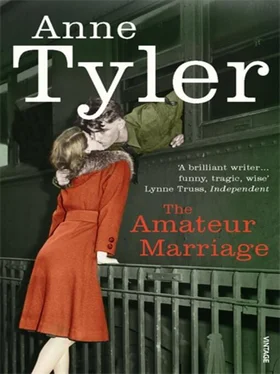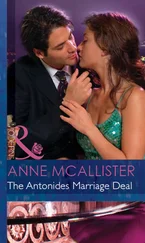“Yes,” Pauline said, “you are lucky. Yes, not many can say that.”
She was overcome, suddenly, by a sense of boredom so heavy that she envisioned it as a vast gray fog seeping soundlessly through the room.
So when the crash came — a heart-stopping wham! and a clatter and a series of tinkles — she welcomed the diversion. She straightened in her seat and glanced hopefully over Dun’s shoulder. In the open, tiled space just in front of the hostess’s podium, their waitress slapped her own cheeks and stared down at a mangle of crockery. “Mercy sakes!” Dun said, but Pauline said, “Don’t look!”
“Pardon?”
“That’s what my daughter tells me — Karen. She once took a hostess job to help with her law-school expenses and to this day, if we’re in a restaurant and someone drops something, she tells me, ‘Don’t look, whatever you do! Pretend you haven’t noticed.’ That poor waitress; she must be mortified.”
“I thought there’d been an explosion,” Dun said, returning obediently to his steak. He cut himself another piece while behind him, the waitress tucked her skirt up and knelt to gather half-moons of plates and cups missing their handles. Chink-chink, they landed on her tray. The other diners watched with interest, but Pauline gazed tactfully to her left where, she suddenly noticed, a white coffee cup sat all by itself in the center of the aisle. Dun was saying, “You have a daughter who’s a lawyer?”
“Yes, she works for this advocacy group that helps people who are on welfare,” Pauline told him. The cup stood right side up, a single flash of white in the gloom, and as far as she could see it wasn’t even chipped. This made it appear to have been set there for some purpose. Should she point the cup out to the waitress? Or would that be interfering? She forced herself to look again at Dun, who was saying, “I’ll bet you’re proud of her.”
“Proud?”
“Having a lawyer in the family.”
“Well, yes, though you’d never know she was family, because she’s changed her name to Antonczyk.”
Dun stopped chewing and asked, “Why would she do that?”
“Isn’t it the limit?” she said. All right, she would gather the energy to try one more time. She laughed and shook her head. “That was my husband’s last name two or three generations ago. They changed it to Anton, I don’t know when, and now here she is, Antonczyk, back to her roots and so forth. We all said, ‘Who?’ We said, ‘What?’ But that’s Karen — a mind of her own.”
“One of Matties nephews did the exact same thing,” Dun said.
“He did?”
“Only he changed his first name. He changed it from Peter to Rock.”
Pauline thought this over.
“He said it meant the same thing and it had a more snazzy sound, but I don’t know; the family was pretty upset. Mattie told him that someday he would want to change it back. He mentioned that to me at her funeral. He said, ‘Already I’m starting to want to. Aunt Mattie was right.’ He thought the world of her; all of them did. She never forgot a birthday. She sent them cards for every occasion, Christmas and Easter and Valentine’s Day and Thanksgiving and Labor Day, even.”
Over Dun’s left shoulder, Pauline saw a very old couple entering the restaurant. They paused at the hostess’s podium, but the hostess was nowhere in sight. They looked at each other. The man advanced a few steps and glanced back at his wife. She seemed doubtful. The man had a felt hat in his hands and he turned it nervously by the brim as he advanced yet another step and another, while behind him, his wife ventured a step or two herself. The man gathered speed; he seemed focused on a certain table somewhere to Pauline’s rear, and he kept his eyes fixed on it as he walked smack into the white cup. Ching! It rang against the tiles and took off, spinning like a top, with a circular, metallic sound that brought the hostess rushing up out of nowhere. The couple froze and then pivoted in unison and stumbled toward the door. The expression on the husband’s face in the instant before he turned — pure bewilderment; how in heaven’s name to explain such a strange faux pas? — struck Pauline’s funny bone and she got the giggles. She tried to keep quiet, of course. She tucked her chin down, shielding her mouth with one hand. But she was laughing so helplessly that she made a kind of honking sound, and tears began running down her cheeks. Dun, who had started slightly at the first ching but (perhaps recalling her instructions) remained facing forward, seemed not to notice her behavior. Or maybe he was being diplomatic. At any rate, he went on talking. “Even May Day; remember May Day? Most people don’t. I can’t figure what happened to May Day. Folks used to hang baskets of flowers on people’s doorknobs and Mattie still did, the prettiest little baskets she bought in bulk at the crafts supply and trimmed with ribbon. I’ll be so broken up when May Day comes this year. I don’t know what I’m going to do.”
Pauline collected herself, finally. “Yes,” she said, “it’s going to be hard. I’m so sorry she won’t be here.” And other things, other consoling, murmuring, commiserating things. But her mind was a mischievous animal cavorting elsewhere as she wiped her eyes and tucked her hankie away and started slogging through her crab cake and her coleslaw and green beans.
In spite of everything, she asked him in when he brought her home. She just hated to walk alone into an empty house. She hated the abruptness of it, the sudden contrast. So she said, “Won’t you come in? I’ve got cocoa”—sensing that cocoa would be his beverage of choice.
“Cocoa!” he said. “From scratch?”
“Naturally from scratch.”
It was Nestlé’s Quik, but he would never know.
She settled him on the living-room couch and she made him take off his sport coat, and when she brought him his mug of cocoa she sat on the couch also, even though she had no interest in him and would, in fact, have felt repelled if he’d moved any closer. (Not that there was the remotest chance of that.) His cragginess struck her now as dried-upness; his midwestern accent seemed priggish. But she said, “This has been so much fun! I don’t know when I’ve had such a nice evening.” And when he handed back his mug and said he couldn’t believe he had stayed this late, she said, “It’s just like that song, isn’t it? Like ‘Two Sleepy People.’ I used to think of that song when my husband and I were courting. We’d come in from a date and we’d both be falling on our faces with tiredness but you know how it is; there was still so much to talk about, so much we wanted to tell each other… and it always made me think of that song about the couple who couldn’t bear to say good night. Do you remember that?”
“Oh, yes,” Dun said. “I remember it well.” But he was reaching for his sport coat as he spoke.
She phoned Pagan at his dorm. It was only nine o’clock — the shank of the evening, for him. Some other boy answered and then shouted for him raucously. “Anton! Pay Anton?” he bellowed. But finally he said, “Sorry. Guess he must be out.”
“Well,” Pauline said, “tell him that his grandma called, please. No special reason; just wanted to gab.” She didn’t suppose Pagan would ever get the message, though. He lived in a way she couldn’t imagine, boys and girls tumbling all over each other and dreadful music blaring down the halls, although he seemed to be thriving.
She phoned Katie on the pretext of thanking her for lunch. But Katie said, “Oh, you didn’t have to — what, sweetheart? It’s Pauline,” so Pauline knew enough to say a quick goodbye. Katie didn’t even ask how her date had gone; that was how eager she was to get back to her husband.
Читать дальше












